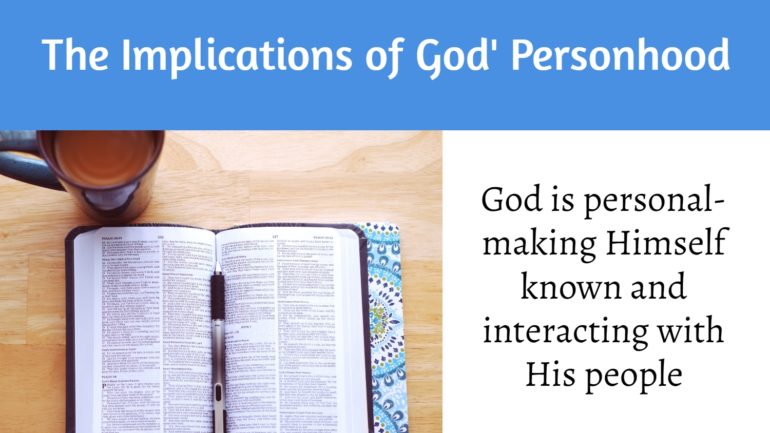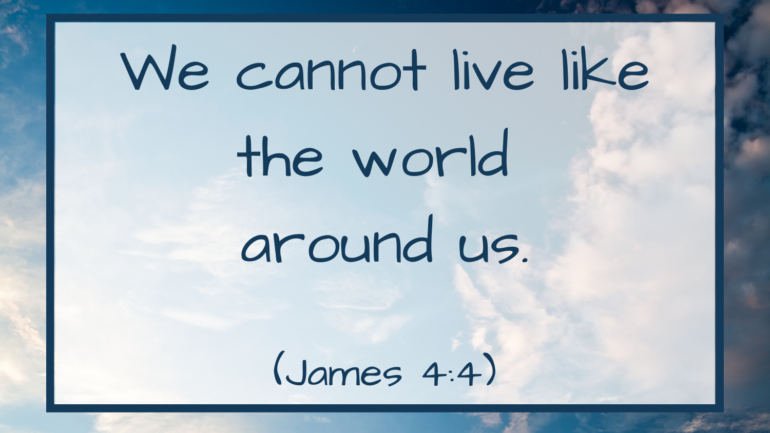God’s personhood means that we can know Him intimately. We can talk to Him through prayer, and hear Him speak through Scripture. We can love Him and trust Him.
I’m sure we’ve all seen Star Wars, or we’re at least familiar with it. In the movies, there are Jedi warriors who rely on “The Force,” this impersonal, cosmic energy that they can manipulate to help them. It guides them and gives them strength and protection. The Force, in a sense, is their god. Unfortunately, many religions in the world view their gods in the same way. Many African religions and Asian religions, such as Buddhism, see their god as a force or power that exists all around them. They don’t love their god. They don’t pray to him or express gratitude to him. They pretty much ignore him until they need him. Then, they manipulate him to bring about the desired result. In fact, they don’t see their god as a “him,’ but rather as an “it”.
The author I was reading even grouped the Word-Faith movement, what we call the Prosperity Gospel, into this category. After all, what do they teach with the Prosperity Gospel? If, when they get sick or need money, they pray the right prayer, say the right words, with enough faith, then God is obligated to give them what they want. They try manipulate God with their words to get what they want from Him. According to Joel James, to all of these religions God is power to be used, not a Person to be loved.
Ignoring God’s Personhood
Even Bible-believing Christians can fall into this trap. We know that God is a Person, but we treat Him as if He’s not. We ignore God until we need Him. Then we pull Him out, hoping that He’ll help us. We tend view God dispassionately or distantly. We have a hard time turning our head knowledge about God into heart knowledge of Him. We know about Him, but we don’t really know Him. Joel James describes it this way:
You might occasionally be tempted to think of God as if He were merely an idea, a theological theorem. But God is more than an article in your doctrinal statement; He is more than a paragraph in a systematic theology textbook…He is not a force to be reckoned with or a philosophical premise to be debated. God is a real, infinite, divine, triune Person to be passionately loved.
How can we know that God is a personal being?
When so many people treat their god as an impersonal power, how can we know for sure that our God is different? What evidence do we have for God’s personhood?
We actually have a lot of evidence to prove that God is personal:
We know God is personal because we are made in His image, and we are personal beings.
I did a Google search for “signs of personhood.” I wanted to find out what it means to be a personal being. I found an article from the University of Missouri[1], which listed several criteria of personhood:
- Rationality or logical reasoning ability
- Consciousness
- Self-awareness
- Use of language
- Ability to initiate action
- The ability to form moral judgments
- Intelligence
Looking at this list, I think it’s clear that God meets all of these criteria. He is a logical, rational, intelligent Being. He uses language to communicate, and He is definitely able to form moral judgements, as He is the standard of morality.
It’s also clear that humans are the only created being (besides angels) that possess these abilities. A rock is not self-aware. A tree cannot form moral judgments or use logical reasoning. Although some might disagree, animals do not really use language to communicate. Human are unique in that aspect.
Being made in God’s image also means that we reflect certain aspects of His character. We talked before about how some of His attributes are communicable, which means that He shares them with us. All of the attributes we’ve studied so far—holiness, wisdom, justice, mercy, grace, love, faithfulness, and truthfulness—are attributes that we can possess. These are also attributes that are only true of a personal being. An inanimate object cannot be holy or show love or mercy or grace. Only a rational, intelligent, moral, self-aware person can possess those characteristics.
We know God is personal because God wants to be known and loved by His creation.
In the 17th and 18th centuries, a movement emerged called Deism. Deists accept the idea of a Creator, but deny that this Creator has any interaction in the lives of people. They view Him like a watch maker. He created the world and wound it up, setting everything in motion, but then stepped back to let it run on its own. However, this directly contradicts what we read in Scripture.
The very fact that we have a Bible is evidence that God wants to be known. It reveals God’s personhood. If He had not chosen to reveal Himself in such a way, we wouldn’t know anything about Him. Yet He decided to give us a book that contains extensive knowledge about who He is and what He has done throughout history. The Bible reveals event after event where the hand of God is clearly active. He is not letting the world run on its own. He’s very much involved in the events of human history.
Thus says the Lord: “Let not the wise man boast in his wisdom, let not the mighty man boast in his might, let not the rich man boast in his riches, but let him who boasts boast in this, that he understands and knows me, that I am the Lord who practices steadfast love, justice, and righteousness in the earth. For in these things I delight, declares the Lord.”
Jeremiah 9:23-24
The Bible also makes it clear that God wants to be known by His people. According to these verses, God delights in our knowing Him, and so should we. Knowing God should be more important to us than worldly wisdom, power, or riches.
Jeremiah 31:33-34 shows that knowledge of God is part of the new covenant that He has made with His people:
For this is the covenant that I will make with the house of Israel after those days, declares the Lord: I will put my law within them, and I will write it on their hearts. And I will be their God, and they shall be my people. And no longer shall each one teach his neighbor and each his brother, saying, ‘Know the Lord,’ for they shall all know me, from the least of them to the greatest, declares the Lord. For I will forgive their iniquity, and I will remember their sin no more.”
These are obviously the words of a personal being, who desires a relationship with His creation. As a result of the new covenant, God’s people will know Him in a way that they never have before. The culmination of the new covenant is seen in the coming of Christ, through whom God revealed Himself much more clearly than ever before.
We know God is personal because of the interaction we see within the Trinity.
God is one in essence, but that He exists in three persons. The Bible describes the interaction within the persons of the Trinity, and it’s very personal. We see this interaction from the very beginning, where the Godhead is conferring before the creation of man. In Genesis 1:26, God says, “Let us make man in our image, after our likeness.” It’s like the three persons of the Trinity are talking amongst themselves, planning what they will do to create mankind. That’s not something you’d expect from an impersonal force. It implies a close relationship and a level of communication that would only be possible for personal beings, thus proving God’s personhood.
This relationship within the Trinity is especially obvious between Jesus and God the Father. When Jesus is baptized in Matthew 3, God the Father speaks audibly for everyone present to hear, expressing His pleasure in His Son (v.17). In John 17, Jesus prays to God, expressing His desire to glorify His Father (v.1, 4), and acknowledging that God has given Him a people (v.6-8). He says that He will be coming back to the Father (v.11, 13) and that He and the Father are one (v.21-22). He also mentions the love that He and the Father have for each other (v.23-24). Pleasing someone, being with someone, giving gifts, and loving others are all signs of a rational being, not some cosmic power.
We know God is personal because of His interaction with people throughout Scripture.
Here are some examples of God’s interaction with people:
- Adam and Eve in Genesis 1:28-31, Genesis 3:8-24. God walked and talked with Adam and Eve in the garden. He also confronted them face-to-face over their sin.
- Abraham in Genesis 12:1-3. Throughout Abraham’s story, God has an intimate relationship with Abraham, appearing to him, speaking with him, making and keeping promises, guiding him and blessing him
- Moses in Exodus 3:1-12. Moses had an even more intimate relationship with God than Abraham. He came near to God and experienced God’s glory firsthand (Exodus 24:2, 15-18)
We know God is personal because of Jesus.
In Hebrews 1:1-4 we see that Jesus is the exact imprint of God’s nature, so everything that Jesus is, God the Father is as well. God spoke through Jesus, and He created the world through Jesus. Now Jesus is sitting at the right hand of God.
Colossians 1:15-20 says that Jesus is the image of the invisible God. He created all thing, and holds all things together. He is the head of the church, whom He loved and gave Himself for (Eph. 5:25-27). He reconciled us to Himself.
Implications of the God’s Personhood:
God’s personhood means we should pursue a personal relationship with God.
Because God is personal, we can relate to Him as we would another person. How do you develop a relationship with a person? Spending time with them, talking to them, listening to them, doing things for them and with them. We can do all those things with God. He’s with us all the time, so we should make an effort to be aware of His presence. We can talk to Him through prayer and listen to Him speak through His Word.
However, we must be careful that we don’t become too familiar. I have been binge watching these shows by a group ghost hunters. Now, I don’t believe in ghosts, but that’s another discussion. These guys, though, are Christians and before they go into these “haunted” places, always stop to pray. Only they don’t call it praying. They say they are going to “give a fist bump to the Big Man.” I know they mean well, but that always makes me cringe, because it seems irreverent to me. We need to find a balance between being respectful and being comfortable with God. We’re to show reverence and a proper fear, but He’s also our Father, whom we can approach boldly and confidently.
God’s personhood means we should reflect God to those around us.
I’ve already said that we are made in God’s image and we possess many of the same characteristics as God. It’s our duty as Christians to reflect those characteristics to those around, thus giving glory to God. When people comment on why we’re different, we point them to God. Our desire should be to lead others into the same personal relationship that we have with God.
[1]https://medicine.missouri.edu/centers-institutes-labs/health-ethics/faq/personhood
The information in this post was based on the following resources:
Taste and See that the Lord Is Good: A Study of the Attributes of God by Joel James
Unless otherwise noted, Scripture quotations are from The ESV® Bible (The Holy Bible, English Standard Version®), copyright © 2001 by Crossway, a publishing ministry of Good News Publishers. Used by permission. All rights reserved.






Seeking God's Face: Discovering the God of the Bible - She Lives Worthy %
[…] The Implications of God’s Personhood (blog post) […]